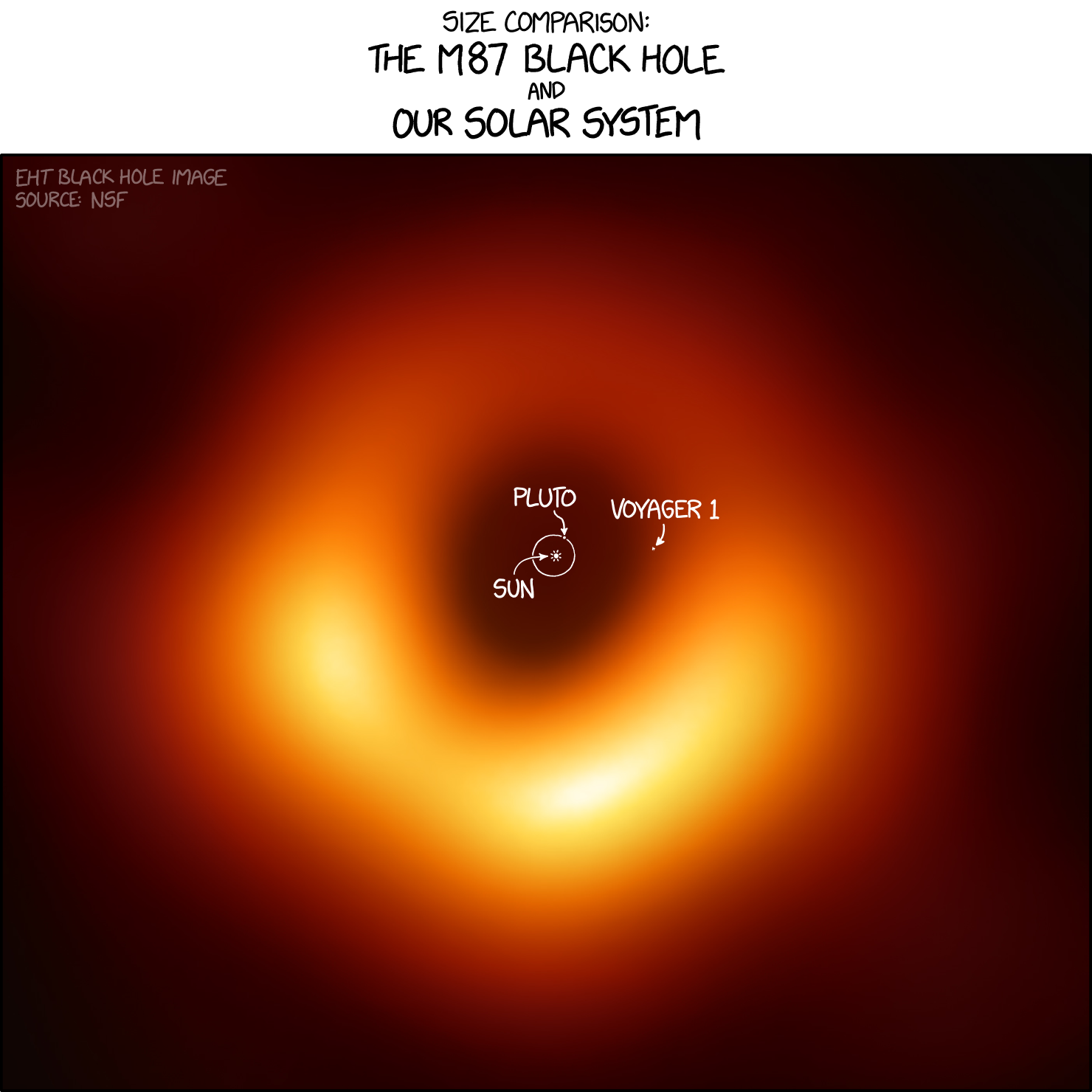![]() You don't need to be an 'investor' to invest in Singletrack: 6 days left: 95% of target - Find out more
You don't need to be an 'investor' to invest in Singletrack: 6 days left: 95% of target - Find out more
Amazing picture, and the figures are baffling
First ever black hole image released
I did a search and didn't see any other posts, although I may be caught in the event horizon
The thing about space, right, is that it's black, yeah?
Looks like Slough.
Programme on BBC4 tonight about Black Holes..
I wonder what it would look like close up?

Yep, program on tonight about them. Bbc4 I think?
Yep, BBC4 at 2100 tonight. There's an hour long Sky at Night on at 2000 as well.
Muse will enjoy the extra royalty cheques!
So..........What we are seeing now is......how old? Is it still there? What happens to black holes? Surely they can only suck in so much matter? And then what?
Then the Falcon Heavy from 2330 BST onwards (spacex youtube channel)
Let's not forget the Japanese meteor landing.
What happens to black holes? Surely they can only suck in so much matter? And then what?
They 'burp' the matter back out, I'm not sure if it's continuous but the phrase 'burp' suggests it's only occasionally when matter is so dense and that it can't do anything other than spew it back out

So……….What we are seeing now is……how old? Is it still there? What happens to black holes? Surely they can only suck in so much matter? And then what?
What that image shows is 55 million light years away, in the Virgo galaxy cluster, and it’s the equivalent to 6.5 billion suns the size of ours.
So what we’re seeing is 55 million years old, and is quite likely a lot bigger now, ‘cos it’ll just keep swallowing everything that gets close enough to be trapped by its gravity, so other stars, planets, dust, gas...
Most galaxies have a black hole in the centre, including ours, called Sagittarius A*; it’s significantly smaller, though.
Thing is, a black hole is a gravitational point-source, it has no effective diameter, what appears to be the diameter is the even horizon, or Schwartzchild radius, the actual diameter of the original star that collapsed in on itself and formed the original black hole, after going supernova.
If such an object is situated in a crowded area of a galaxy, it could trigger a chain reaction, the combined local gravity causing a whole group of stars to just collapse into one huge mass, which in turn will keep swallowing local stars and matter.
It’s a bit like a Labrador, keep feeding it, it’ll keep eating and getting bigger!
Nobody can possibly know how big such an object can get, conceivably, one could swallow an entire galaxy.
But the timescale is equally inconceivable.
What mattyfez describes is a Seyfert galaxy, or a quasar:
https://en.m.wikipedia.org/wiki/Seyfert_galaxy
I'll get my coat then 😀
The two most recent videos on the Veritasium YouTube channel are good explainers of the image:
So much data they physically flew it. The image shows 64 HDDs, wonder how big each is.
PSA: Horizon, BBC4 11.30pm is all about how they got this image.👍
It’s awesome stuff, love it.
The thing that boogles my noodle about this, is Einstein. How? Just, how? How can someone get all this stuff correct? In the 1910s? He must be an alien, or from the future or something. It’s just amazing.
In one way I love this stuff. YOu never know what they will find. In another I think - "couldn't all that brain power be used for something a bit more useful?
All hail the ubernerds!
The most amazing to me is all the stuff we don't have a clue about!
Dark matter and dark energy for a start.
Meaning the vast majority of the universe is totally unseen. We don't even know what it is made of! We are still ants looking up at the sky.
The more questions we answer the bigger and more numerous the next questions will be.
Off to watch Interstellar a bit later I think...
couldn’t all that brain power be used for something a bit more useful
It is useful as it is - trying to work out how the universe works leads to better understanding of how things work at atomic scale. A good example is quantum mechanics - quite a bit of modern technology couldn't have been invented without that understanding - GPS, for example.
Einstein's maths predicted black holes but he said that they were impossible.
Didn't Steven Hawkins show that black holes radiate energy and so do not just keep getting bigger and bigger?
Please correct if I have got this wrong.
I like physics but it gets weird quickly - ploughing through Feynman's Six Easy Pieces and chapter two says that electricity, radio waves, light, x-rays, they're all the same just wobbling at different speeds. How does that work?!? 🙂
Isn't the term black hole a bit insensitive?
What's wrong with calling them space holes?
Didn’t Steven Hawkins show that black holes radiate energy and so do not just keep getting bigger and bigger?
Yes, Hawking radiation. To answer the question about what happens to matter that gets sucked in...well once inside the event horizon any matter is completely and utterly obliterated into its most basic constituent sub atomic particles and even more basic than that...who knows what sub atomic particles are consisted of. Who knows what matter actually is? But things are mostly empty space anyway (if you take away the empty space within the atoms you can fit a Nimitz class aircraft carrier inside a base ball), so there is not a lot of matter in the universe at all, so not much to deal with once it gets sucked in - or rather falls into a black hole. The singularity thought to be at the centre of each black hole is only very small but so dense to generate the gravity. The gravity is so strong within the event horizon then physics just doesn't apply, time itself doesn't exist so who knows what actually happens to matter and energy.
Nobody really has a clue. You can't look inside a black hole so can't directly observe it. You can observe the effects of black holes, which is how they were predicted their existence the first place a hundred years or so ago long before we observed any...they were needed to make the observable universe around them make sense.
It's utterly fascinating. It boggles the mind. And dark energy and matter.....well that is a whole other thing that will keep the world of physics going through our lifetimes and beyond. Personally I can't think of a more useful endeavour that mankind can put its efforts to. So many technologies that have hugely benefitted mankind and our environment has come out of better understanding of the universe and how it works. I don't mean every human being on earth should be physicists, but until we understand more about the universe, our place within it, then we'll never be able to put a meaning around our existence. Ultimately our entire existence on this planet is really about trying to understand how we get off it and survive out in space without a planet - the Earth is a temporary lifeboat for us. We only have a billion years before the earth becomes uninhabitable as our sun starts to die and expand as it turns into a Red Giant, and we've got a lot of technology and understanding to crack before we're ready to get on a big space ship that can indefinitely support human life as we wander through the universe.
Can't help thinking of the bidet thread when I look at this picture...

I'm sure they'd have got a better quality photo if they'd used a flash.

So much data they physically flew it. The image shows 64 HDDs, wonder how big each is.
That's just some of it. 5 petabyte dataset according to this: https://www.npr.org/2019/04/10/711723383/watch-earth-gets-its-first-look-at-a-black-hole?t=1554976347928
There's bigger now but assuming 8 or 10TB drives that were available a couple of years ago what's in the picture is 10-20% of that.
A quick update to this, here’s an arxiv.com article on black hole imaging from 1972 onwards. It’s a bit technical...
I have a new theory on the origin of the universe but I'm not sharing it with you lot in case there's a Nobel Prize in it.
What mattyfez describes is a Seyfert galaxy, or a quasar:
Actually, black holes themselves have been observed to "burp" matter. A quasar is a galaxy with an incredibly bright and active centre: it is likely this brightness and activity is the result of the presence of a black hole; either entirely, or in part.
Muse will enjoy the extra royalty cheques!
It's a supermassive one too.